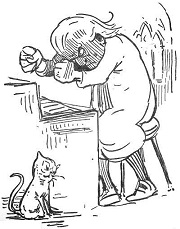A Hard Left Or An Easy Right - Decision Making
Decision! Decisions!

A Rule Of Thumb For Making Decisions
Life is full of decisions. We make decisions all the time and most of these are subconscious and made with little thought. In fact if you had to stop and think about every little thing you did, you'd go nuts. Practice and habit have a lot to do with it. You get up in the morning and fall into a routine - the automatic pilot takes over and you glide along doing ordinary things while your mind is charging along in many other directions.
But there are also many situations that demand a bit more thought; sometimes we make the wrong choice, while at others things work out perfectly. After a while, or to put in another way, as you gain experience (i.e. grow older) you can find a pattern emerging.
Similar situations repeat themselves and the choices you make are similar - and those you remember are the ones that went wrong. And the decision taking moment was usually without much thought and perhaps implied less effort than if you had taken the difficult choice. Breaking the pattern can be a good thing.
You will find examples of this at work, at home, in relationships, when taking risks, in matters of the heart - and more critically at those crossroads in life.
Decision Making Tips
Decisions and Choices
A decision implies there is a choice. And this always means a risk - what will vary is the degree of risk.
Always a choice and it is always more than one. Even if you do nothing it is still a decision based on a choice.
If there wasn't it wouldn't be a decision, just a fact of life.
Just like problems. For something to be a problem there has to be a solution - even if it is not the one you want - if there isn't a solution, it is not a problem. It just is. Decisions work the same way.
All decisions have consequences, and this has a lot to do with analyzing beforehand and with follow-through. You decide to marry and so you pop the question. You're accepted. The follow-through is all important, for both of you. There'll be good times, bad times and down right awful moments. The follow-through is what makes the difference. An easy right could mean breaking up (a decision in itself) - a hard left making it work.
And if you are true to the beginning, the whys and wherefores, the end will be a destination and the journey will be the reward.
A rule of thumb for making decisions (and just to make it more interesting this means it doesn't always work but it does mean life should never be boring) is to go for the tough choice, the hard left; the other choice, the easy right, will give you back as much as you put into it or worse.
A simple example - my own to be clear. At one time I was rather fond of a drink or three. The easy decision was "have another", which I did with a lot of dedication and continuity. And then one day I decided to take a hard left. That moment was the tough one, the continuity was demanding, but the result: the correct one.
So what do you think?
A hard left or an easy right?
Fear and Decision Making
Hub updated August, 2014
I am reading The 4-Hour Workweek by Timothy Ferris and the idea is a change in life - and breaking away from some of our preconceived notions. However I mention this as it does have a lot to do with decision making. The book has a lot more obviously, but I want to highlight something that struck me as very important.
I have been writing about taking "the hard left" and not the "easy right". Although Ferris doesn't use these terms he does write about fear in our decisions. He goes on about how often we stay in our comfort zone through fear and how by facing it head on, we can change our lives. Where it gets interesting is both the examples given of breaking away and the changes in the goals you can choose.
At times we disguise our fear and rationalize it in many ways. Optimistic denial for example which is simply wishful thinking - basically that given enough time things will change. Or as that overused cliché attributed to Einstein says about insanity "doing the same thing... and expecting a different result".
The Strength of Fear
- Fear is a trigger for inactivity and procrastination.
- Fear can also cause that most terrible of decisions, the ones that make you change your mind continuously.
- Fear can push you to decisions that can harm you - fear of the unknown that make you stay as you are.
So what can you do?
Get into the why.
- Why are you doing whatever it is you are doing.
- Why do you decide to move or stay or go.
- Why take a risk or avoid a risk.
You have to want to change and the first step is to turn off the automatic response to most things and look into you own "why".
"Know thyself."
Be willing to take the risk - and good starting point is look at what will happen if you don´t. Probably nothing, but is that really what you want? Nothing or much more of the same thing.
Remember life is short and we should try to live it fully.
Courage is the answer.
Imagine for a second how you would feel, and be, if everything you did was done with passion. And you need courage to live passionately.
An interesting foot not is that the word "passion" comes from the Latin "passio" which means suffering. And it takes courage to be passionate and live up to you own expectations. Specially those you had when younger, before you matured.









